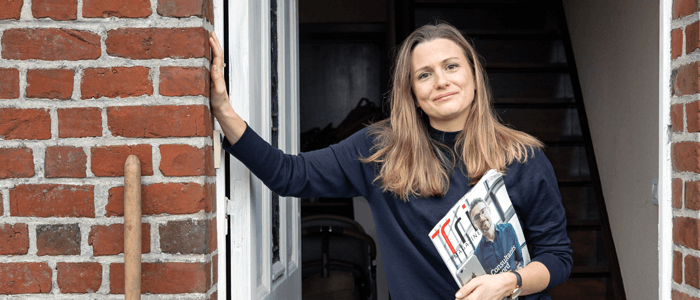City of Roeselare aiming for climate neutrality by 2050
With climate change becoming more evident every day, awareness about climate issues is also increasing, as is the willingness of citizens and governments to take action. Cities and municipalities are important actors for achieving climate neutrality by 2050. In 2017, The City of Roeselare signed the Covenant of Mayors. A year later, the board presented a climate plan for a climate-neutral Roeselare in 2050. To implement its climate plan, the city decided to roll out an organization-wide program with joint climate objectives.
- Roeselare’s climate program runs like a clock
- Co-creation is essential in program design and creation of support
- A cross-sectoral project approach offers clear added value
Climate awareness growing rapidly
For the elaboration and implementation of the program, City of Roeselare collaborated with TriFinance Public.
From the
very beginning, the importance of co-creation was emphasized to ensure
organization-wide support.
' Climate awareness and a related theme such as circularity are evolving very rapidly’, says project consultant Helena Vandekerckhove, who has been working on the project for TriFinance since September 2019. ‘You cannot ignore it any longer. Many of Belgium’s corona-recovery measures are linked to climate objectives and local authorities will play a crucial role in their implementation.’
There is a strong will to take big steps for the climate.
Helena Vandekerckhove, Project Consultant
Matching climate expertise with a process-oriented approach
The city of Roeselare is a rapidly growing regional hub city with 63.500 inhabitants. The city is a pioneer in the field of heat networks in Flanders and tops the ranking of regional hub cities in terms of the number of solar panels per inhabitant. A point of attention is the size of the city’s impervious surface. In order to keep all actions results-oriented, coordinated climate action through program operation is essential.
In this project, TriFinance worked together with the city’s policy officer for Energy, Climate and Sustainable Development. The city’s expertise in climate matters proved to be a good match for the process-oriented approach TriFinance had proposed. The program was sponsored by the City Director of territorial planning. He made sure that the stakeholders got involved by sending the right messages at the right time. The broad support allowed the Climate Program to be approved smoothly by the management team and the college of mayors and aldermen.

120 actions with great climate potential
Structuring the program took four months. The starting point was the analysis of the current and planned projects and actions. Out of approximately 1.000 projects and actions that the city planned this legislature, clear climate ambitions were defined for some 120 actions. Mainly actions with a high climate potential were selected. This includes both actions that the city itself carries out such as road works or renovations, actions where the city acts as a regulator, and actions where the city takes a facilitating, stimulating and/or sensitizing role to its citizens.
'The development of a program allows local governments to cluster actions and budgets meaningfully, efficiently, and purposefully,‘ says Timo Wyffels, former policy officer Energy, Climate and Sustainable Development of the City and OCMW Roeselare. ‘TriFinance's cross-sectoral process approach brought extra drive to the program, taking colleagues' projects to the next level. At the same time, we were able to respond quickly to various project calls from higher authorities: EU, the Flemish region, the province. After all, in the coming years, this will be a key area for EU subsidies. '
TriFinance's cross-sectoral process approach brought extra drive to the program, taking colleagues' projects to the next level.
Timo Wyffels, former policy officer Energy, Climate and Sustainable Development of the City and OCMW Roeselare
From heat grid to climate adaptation with 100.000 trees
The climate program of the City of Roeselare consists of four pillars, for each of which organization-wide quantitative objectives were set. During the workshops that were organized for each pillar, a lot of attention was paid to cooperation and interrelationships.
For each project, climate targets were defined and quantified, such as a 10 percent energy decrease by renovating city buildings; the planting of 100.000 trees; the production of 1 GWh of green energy by city buildings; the production of 1 GWh of solar energy through citizen cooperatives or 104.300 m³ of additional buffering capacity. 'In this way we were able to translate the far-off targets for 2050 into ambitious yet realistic targets for 2025,' says Helena Vandekerckhove. ‘Measurable objectives are motivating. They let goals come to life in an organization.'
The four pillars
- Pillar 1: The expansion of the city’s heat grid to almost double the capacity in 5 years time. From 10 to 18 percent sustainable heat for the city territory (+ 50 GWh).
- Pillar 2: Boosting renewable energy to more than doubling in 5 years. From 6 to 15 percent of electricity generated by solar energy (+ 50 GWh) of which 1GWh will be produced by the city’s (heritage) buildings. As a reference, 1GWh meets the energy needs of some 250 households.
- Pillar 3: Accelerating the degree of house renovation: keeping heat consumption constant despite an increasing population and the growth of industry.
- Pillar 4: Climate adaptation: expanding urban green spaces by planting, among other things, 100.000 additional trees, and taking measures to avoid flooding and drought.

Various pilot projects
For each pillar, a strategy was defined that outlines the concrete approach towards 2025, also looking ahead at 2030. To speed up implementation towards 2030, various pilot projects had to be initiated, such as participatory and cooperative wind turbine projects; the introduction of circular water systems in buildings; or turning low-lying flood-prone agricultural zones into areas where food production can be combined with water buffering and infiltration capacity.
'We have also examined internal processes in order to address climate issues at an earlier stage, and initiate a stronger cross-domain approach,' Helena says. ‘An example of this is the cooperation in the context of land reparcelling and consolidation that we really want to weigh on, by thinking along in a solution-oriented way. Local authorities can fall back on a large knowledge network on different levels, including other European cities or research institutions. To speed up innovation in the climate domain, we stimulated maximum knowledge exchange.'
Climate change is a big challenge for any city or society. The guidance we received from TriFinance resulted in an ambitious, but focused climate program with targets for 2025 – 2030 and 2050.
Nils Vanantwerpen, Director of Territorial planning of the City and OCMW Roeselare
Setting up the program structure
Once the program had been developed, the structure was set up over a period of only four months. It consists of a climate team, a program team and a political steering committee. The climate team consists of project leaders from different expertise domains. They have to ensure proper operational execution of the program. The program team is a mixed, cross-divisional team that monitors the program’s strategic lines. The political steering committee, which includes almost all aldermen and the mayor - meets twice a year to follow up on the program and strategic decisions.
'The climate challenge requires constant openness to rethink solutions in a market that is constantly changing,' says Helena Vandekerckhove. ‘Crucial for this project was the question of how we could translate the City of Roeselare’s climate ambitions into objectives and involvement at all levels of the City’s organization. How could we, for instance, ensure that City Departments systematically include climate objectives in their actions and projects?' To achieve this, the program needed a structure that is accessible enough for the Policy Unit to think organization-wide about sustainable solutions.
'Climate change is a big challenge for any city or society,' says Nils Vanantwerpen, Director of Territorial planning of the City and OCMW Roeselare. ‘The
guidance we received from TriFinance resulted in an ambitious, but
focused climate program with targets for 2025 – 2030 and 2050. Two years
later in the collaboration, the program runs like a clock, combining
policy development with tangible results that have become visible in
City’s organization and on the streets.’
Related content
-
Article
How data management enables faster, better decision-making across the organization
-
Reference case
How Data kickstarted a transformation at a leading financial institution
-
Reference case
Helping a major bank turn complexity into structure: Olivier Renard on his digitalisation mission
-
Blog
E-Invoicing Compliance 2026: Where does your organization stand? Take the survey
-
Blog
Growth Story: Jorn Hillaert – Building change through people and co-creation
-
Blog
How cross-functional teams strengthen climate risk assessments
-
Career as Consultant
Junior Finance Consultant | Public Sector
-
Career as Consultant
Medior Finance Consultant | Public Sector
-
Career as Consultant
Senior Finance consultant | Public sector
-
Career as Consultant
Junior Consultant Public Procurement | Public Sector
-
Career as Consultant
Medior Consultant Public Procurement | Public Sector
-
Career as Consultant
Senior Consultant Public Procurement | Public Sector